Downplayed
[Today’s guest post by Crystal Kupper is part of our paid blogging program.]
Last month, when I wrote about the value and worth of four-year-old Sophia, I wasn’t surprised that people were taken with her story. After all, the photos spoke for themselves. How could anyone not read her tale of initial neglect and starvation, to finally adoption and love, when there are before-and-after shots like these to illustrate?
Within a few days, other pro-life blogs picked up the post, and through social media, it garnered more than 16,000 likes, 10,000 shares and 500 facebook comments. It was immensely flattering to hear from SPL’s editor that my post was their most-read of the year.
As I scrolled through the comments, three themes quickly jumped out. The vast majority had nice things to say, like “Look what love can do! What a beautiful girl,” and “Kudos to the adoptive parents.”
The second group wasn’t nearly as positive, just mad. Trust me, I understand the fierce protectiveness and righteous anger behind comments like “Whoever did this to this beautiful child should be taken out back and shot” and “When I got through with her abusers, they would look a lot worse than Sophia!” I found it incredibly ironic, however, that the same people who were fired up over the slow violence shown to Sophia wanted to solve the problem with a quicker version. But that issue is one for another blog post.
The last group of commenters fascinated—and bugged—me. “These photos are obviously digitally altered, because nobody could look like that and live.” “I don’t think this is the same child. The navels are totally different.” “This isn’t real.” Trust me, I wish it weren’t.
Those comments are easy to refute. When Lauren, Sophia’s adoptive mom, traveled to Bulgaria to bring her home, she did so with a medical team, because no one was sure if this sweet, fragile ten-pounder could survive the trip. As soon as they hit the ground in Portland, Oregon, they headed straight to the hospital for an intense, multi-day regimen of nutrition therapy and overall medical rehab to stabilize her starved body. So her physical size and great need are quite simple to prove; it’s all documented. Plus, I and many of my Reece’s Rainbow buddies have met her and held her—doing so even inspired my friend Haley to adopt her own special needs child from Eastern Europe—and we can all say for sure that she really was that small!
So it wasn’t people doubting the truthfulness of the story that bothered me. But I couldn’t get those comments out of my head. I mentioned the “controversy” to Lauren, and her reply struck me:
“I kind of wish those looking for reasons to downplay this could have been the first one to change our sweet daughter’s diapers last November.”
Because Sophia’s tailbone and hips had no fat to cover them, they were poking straight out of her backside. She looked like a living skeleton, and in reality, that’s exactly what she was.
Her orphanage caretakers saw her every day. But they, like many of us when confronted with abuse, reasoned that it wasn’t that bad.
They downplayed.
As humans, we’re naturally drawn toward beauty, and repelled by ugliness. And what could be uglier than society’s strongest murdering society’s weakest, most innocent members, whether slowly through abuse or quickly through an abortionist’s forceps?
Child abuse is ugly. Abortion is ugly. (If it weren’t, why all the controversy, whether major or minor, every time photos of abused or aborted children are shown?) Humanity abused is flat-out, soul-crushingly repulsive.
So we either do something about it, like Lauren did, or we look the other way. We question the situation’s veracity. Or we ignore the topic entirely, using polite terms like “choice” and “personal issue.” After all, if we can’t see it—if we insist that it can’t really be that bad—then it’s not real, right? Like the local Germans who lived directly outside WWII-era concentration camps yet didn’t know its horrors until forced to see, we ignore what is happening in orphanages across the world, homes on our block, and Planned Parenthood offices in our town.
But it doesn’t have to be this way. There are so many ways to look the ugly truth in the face and reflect beauty back instead. We can follow along and support families like the Hortons, who are currently adopting two more special-needs children. We can give to pro-life organizations like SPL. We can advocate for foster children, volunteer at pregnancy resource centers, educate our friends and family about the humanity of both the born and unborn, and support and empower women (and men!) in our spheres of influence who face an unplanned pregnancy.
For the sake of Sophia and the millions of nameless others like her—ignored, abused, and dismissed—we must resist the urge to downplay their pain, all so we can avoid feeling any ourselves. That tactic is great for our conscience, not-so-great for the babies. Just ask Sophia. Unlike preborn babies, at least she can answer.

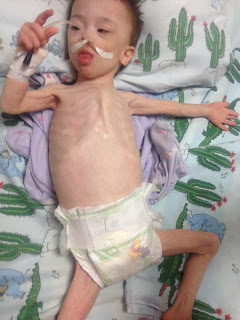
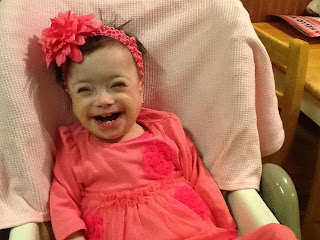
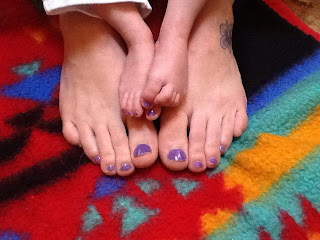
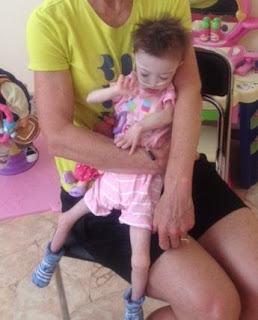
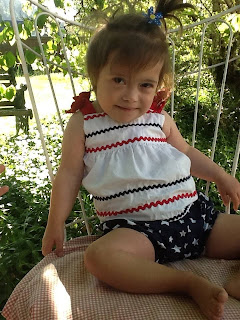
"I found it incredibly ironic, however, that the same people who were
fired up over the slow violence shown to Sophia wanted to solve the
problem with a quicker version."
Maybe, you don't understand justice.
I'm not sure I'm following you. The sentence you quoted follows from the one before it:
""When I got through with her abusers, they would look a lot worse than Sophia!"
Are you arguing that there are situations in which I should starve or torture certain people in worse ways that was done to Sophia because to do so would be the just thing to do?
What then is justice? Is it reducible to retribution or revenge? Is it a virtue or is it something else?
What a profoundly true and touchingarticle. Thank you.
I think these people are just overwhelmed by the horror and need to vent. My dh says this kind of stuff too, but he's never even slapped another person in his whole life.
As Max pointed out, reactions like "taking him out back and shooting him" are not your typical form of justice. That's vengeance.
Those who abused this child should be tried for their crimes and executed.
Justice is the proper recompense for crime. Certain crimes such as torture (as was done to this child) should be recompensed with death.
Well, justice is the proper recompense for crime. But is the proper punishment death? Would that be just? Why?
If the proper penalty for child abuse is death, what should the proper penalty for mere neglect be? Perhaps dismemberment? How about senior neglect? Or, what about casual indifference when I walk by a homeless person asking for food as I walk into whole foods? Maybe just a flogging for that? How much killing and violence do we need to perfect society?
Even if death (maybe by stoning?) is the proper recompense in this case, I find it troubling that some people seem to derive a good deal of satisfaction and emotional pleasure fantasizing about killing certain human beings. Regardless of whether or not death is the proper recompense for certain crimes, I don't see any good reason to be delighted by the thought of getting to be the executioner.
Well said. It's pretty obvious who is being controlled by their emotions, their need to vent and to enact revenge. It's not a logical approach to justice, because justice should involve both deterrence and rehabilitation.
You say "some crimes deserve death." Why? Is there a reason you think that? How doe we know which ones? Can we know? Since you know, what principle of justice am I missing?
Why is the claim that justice is not reducible to revenge vacuous? Is there a reason that you think that claim is vacuous? It seems to me that an eye for an eye is not just because it makes the just person do the very thing the unjust person did that was unjust. And I don't want to go around killing and starving people. Am I wrong to think this? Why?
Is there some why to tell what crimes deserve what punishment? Does the strength of our emotional reaction to the crime direct us to the correct response? If so, then, yes, your answer seems emotional, at least on its face.
Also, reading my reply, I see I am very bad at typing!
Who said i had an emotional reaction? Where do you get that? You just made it up.
You may disagree with the death penalty for heinous crimes but that doesn't make my support for such punishment emotional. Why can't I counter claim that your opposition to such punishment is emotional?
The gravity of the punishment must match gravity of the crime. Heinous acts such a murder, torture, severe child abuse and rape deserve the greatest punishment available. Is that emotional or is that reasonable?
Justice is not revenge. if i was the one starved like this little girl then perhaps you could accuse me of wanting revenge. We don't allow the victims of crimes to determine the appropriate punishment because they are too emotionally involved. Rather we rely on 3rd parties to determine guilt and punishment.